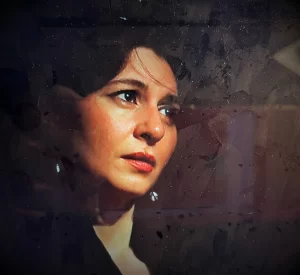Naghmeh Samini is an acclaimed playwright and teaching artist. She is the co-founder of Seda Iranian Theatre Ensemble and recently directed a sold-out run of the Pulitzer Prize-winning play English at ArtsWest. We spoke to Naghmeh about her background, the importance of theatre in her life, and her involvement in Engaged Theatre’s exploration into gender-based violence around the globe.

Before we get into the gender-based violence project, can you talk a little bit about yourself and your career as a teacher and playwright? What brought you to Seattle?
As a teacher and playwright, my career has been fueled by a deep passion for education and creative expression. I began my journey at the University of Tehran, where I earned my MA in Drama Writing and my BA in Cinema, followed by a PhD from the University of Tarbiat Modarress in Art Studies. More than academic credentials, studying theatre instilled in me a profound belief in the transformative power of performing arts to effect change in the world—a belief that continues to motivate me. From 2004 to 2019, I served as Assistant Professor in the Department of Performing Arts, teaching courses such as Playwriting and Theatre History. This role allowed me to immerse myself deeply in the rich traditions of theatre, both globally and within Iran. My move to Seattle in 2019 was driven by a desire to expand my academic and artistic horizons, drawn to a city renowned for its vibrant cultural scene and progressive values.
Can you talk a little bit about the social climate in Iran? The killing of Mahsa Amini by the so-called morality police, and the subsequent protests, captured the world’s attention in 2022. What was the climate like for women when you were growing up? How have things changed since 2022?
The social climate in Iran, particularly concerning women’s rights, has been complex and evolving. Incidents like the tragic death of Mahsa Amini have spotlighted systemic issues and triggered significant protests. During my upbringing, women faced stringent social and legal restrictions, despite some progress in certain areas. Since 2022, there have been noticeable shifts, with increased activism and international attention shaping discussions on gender equality. Regarding the recent death of the President in a helicopter crash, I must clarify that I have not been in Iran since 2021, and thus, I am not familiar with the current climate in the country. Given Iran’s dynamic nature and daily evolutions, being away for about three years holds significant implications. However, I speculate that such an event could potentially influence the social climate, depending on the new leadership’s stance on social issues.
Were you surprised by the climate in Seattle for women? How would you compare gender-based discrimination and violence in Seattle to gender-based violence in Iran or other places you’ve lived?
I have been living in Seattle since 2019, where I’ve observed a different climate for women compared to Iran. Nevertheless, I was shocked by seeing the challenges such as abortion rights and the prevalence of domestic violence. I’ve witnessed ongoing struggles for women’s rights across the United States, reflecting similar challenges I’ve seen in other countries where I’ve resided and traveled. I firmly believe that women’s issues are interconnected globally; the issues faced by Afghan women, for instance, cannot be divorced from those encountered by American women.
Can you talk a bit about your involvement in the gender-based violence project with Freehold? How did you learn about it? What are your goals for this project? What is the experience of working with women from so many different parts of the world?
My involvement in the gender-based violence project at Freehold stems from my dedication to using theatre as a catalyst for social change. As I expressed at the Freehold Gala, this project has been a long-held dream of mine, and being invited to participate felt like a fulfillment of that dream. My primary objective for this project is to amplify the voices of survivors and advocates through storytelling, fostering empathy and raising awareness. Collaborating with women from diverse backgrounds has been incredibly enriching, underscoring the universal nature of the challenges faced and the resilience of those striving for change. A pivotal aspect of the project is collaborating with female playwrights from various cultures, framing women’s issues from different corners of the world within a shared narrative. This approach effectively illustrates how interconnected our challenges are in this interconnected world.
Anything else you’d like to add?
Gender-based violence is a global issue that necessitates collective action. Initiatives like the Freehold project empower communities and foster meaningful dialogue. I am grateful for the opportunity to contribute to this vital cause and am eager to continue this important work.


